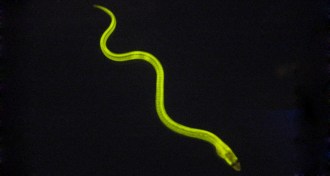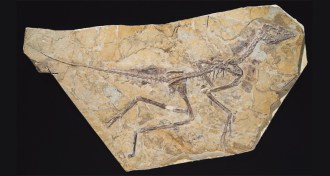Rachel Ehrenberg
Previously the interdisciplinary sciences and chemistry reporter and author of the Culture Beaker blog, Rachel has written about new explosives, the perils and promise of 3-D printing and how to detect corruption in networks of email correspondence. Rachel was a 2013-2014 Knight Science Journalism fellow at MIT. She has degrees in botany and political science from the University of Vermont and a master’s in evolutionary biology from the University of Michigan. She graduated from the science writing program at the University of California, Santa Cruz.

Trustworthy journalism comes at a price.
Scientists and journalists share a core belief in questioning, observing and verifying to reach the truth. Science News reports on crucial research and discovery across science disciplines. We need your financial support to make it happen – every contribution makes a difference.
All Stories by Rachel Ehrenberg
-
 Tech
TechWhat parents just don’t understand about online privacy
Not long ago, police and school officials in Old Saybrook, Conn., held a high school assembly on Internet safety. The purpose of the assembly, wrote New Haven Register reporter Susan Misur, was to make students aware of how public their photos, tweets and profiles are online. To make this point, the presentation included a slide […]
-
 Chemistry
ChemistryCoatings have simple recipe for success
Chemists encapsulate tiny objects using natural ingredients and easy, inexpensive process.
-
 Science & Society
Science & SocietyMath targets cities’ essence
New formula relates city size to infrastructure, productivity.
-
 Life
LifeGenes in wheat relatives help stave off stem rust
Wild and obscure species provide resistance to deadly fungus.
-
 Chemistry
ChemistryHigh methane in drinking water near fracking sites
Well construction and geology may both play a role in pollution.
-
 Tech
TechEye chip sends signals to blind rats’ brains
When struck with light, retinal prostheses stimulate animals' visual cortices.
-
 Chemistry
ChemistryAn eel’s glow could illuminate liver disease
Fluorescent protein binds to bilirubin, a compound the body must eliminate.
-
 Tech
TechComputer scientists grapple with how to manage the digital legacy of the departed
In April, Google added to its services an Inactive Account Manager, which lets you designate an heir who will control your Google data when you die. You choose a length of inactivity, and if your accounts are ever quiet for that long, Google will notify your heirs that they’ve inherited access to your Gmail correspondence, […]
-
 Neuroscience
NeuroscienceResearch prods brain wiring underlying compulsive behavior
Complementary studies, focusing on repetitive grooming in mice, offer potential for new treatment strategies in humans.
-
 Humans
HumansDietary changes accompanied human evolution
Hominids moved toward eating grasses and away from tree leaves, according to chemical analyses of fossil tooth enamel.
-
 Humans
HumansCouples who meet online have fine marriages
Relationship satisfaction for Internet daters is similar to that of people who find potential partners in more traditional ways.
-
 Paleontology
PaleontologyFossil muddies the origin of birds
New specimen may be a feathered dinosaur — or the earliest avian yet discovered